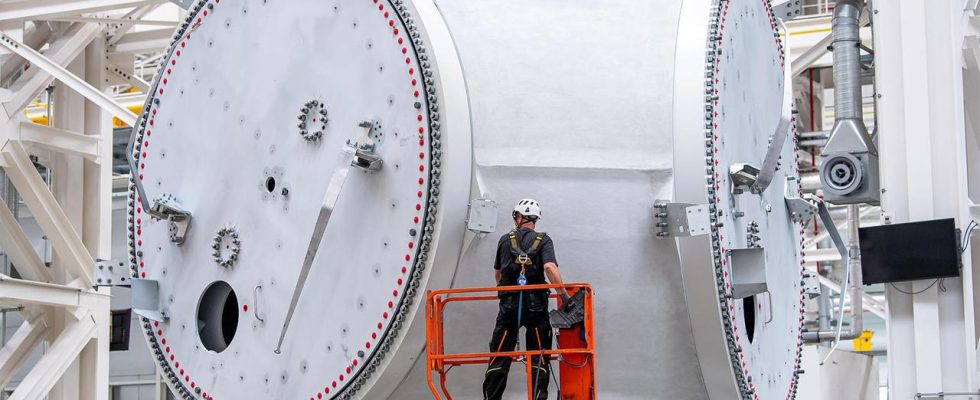background
Siemens Energy negotiated with the federal government about state guarantees for several weeks, and the aid package is now in place. Economists do not see the federal government as responsible.
For weeks, Siemens Energy and the federal government have been negotiating state guarantees for future major projects. It has been clear since yesterday: The federal government is granting the ailing energy technology company a guarantee of 7.5 billion euros. The federal government is thus securing half of the aid package, which is expected to total 15 billion euros. The rest will come from banks and the former parent company and major shareholder Siemens, which holds 25 percent of the shares in Siemens Energy.
In addition to Germany, Spain is apparently also planning to participate in the aid for the energy technology group: Yesterday evening, the Spanish government announced that it was working on bank guarantees for new Siemens-Gamesa projects abroad. This could possibly cover the currently outstanding guarantee amount of three billion euros.
market problems and Management errors
The aid package became necessary due to Siemens Energy’s massive problems in the wind business. The Spanish wind power subsidiary Siemens Gamesa, which has been in crisis for years, is primarily responsible for the fact that Siemens Energy made a loss of 4.6 billion euros in the past financial year.
The fact that the group is currently under so much pressure is – at least in part – due to market problems, says Clemens Fuest, President of the Ifo Institute tagesschau.de: “The market problems result from the fact that the profitability of investments depends heavily on future political decisions, for example on the level of the CO2 price.” Investments are currently being made only hesitantly. “If politicians want to overcome these obstacles to the expansion of wind energy, this can be done through government support in the form of guarantees,” said Fuest.
And yet the Ifo President considers it questionable whether individual companies should be supported by the state with such guarantees: “At Siemens Energy, it’s not just the market problems described, there are also management weaknesses. I would therefore think it would make more sense if politicians focused on interventions that address market problems rather than propping up Siemens Energy in this situation.”
“Fully comprehensive mentality”
Other experts argue similarly: The President of the German Institute for Economic Research (DIW), Marcel Fratzscher, is also critical of the announced state aid and describes it as a “fully comprehensive mentality”. Not the German state, but Siemens AG as the main owner should assume the guarantees.
The President of ZEW, Achim Wambach, comments in an interview tagesschau.de also skeptical: “Government aid to individual companies always carries the risk of distorting competition. Shareholders should also be held responsible. If those who know the company better are not prepared to get involved, then the public sector should also keep its distance take from it.”
Germany is the leader in state aid
Siemens Energy is by no means an isolated case. In recent years, the German state has repeatedly supported companies that had gotten into financial difficulties: compared to other EU countries, Germany is the front runner when it comes to granting state aid. According to the EU Commission, almost 50 percent of approved state aid was registered by Germany last year.
Probably the best-known example from last year: Uniper. The company stumbled after the start of the war in Ukraine and the associated increases in energy prices. In September 2022, the federal government put together a rescue package for the energy company Uniper, which will cost German taxpayers a total of almost 30 billion euros. Since then, the federal government has held 99 percent of the company.
Corona aid for TUI and Lufthansa
Even during the pandemic, the group invested a lot of money in companies whose business was suddenly paralyzed due to the restrictions imposed to contain the pandemic. For example, the state invested in the tourism group TUI. In January 2021, the federal government acquired a total of up to 25 percent plus one share in the world’s largest travel provider. In March 2022, the travel group returned a first part of the credit lines from the government rescue package.
In May 2020, the federal government also put together a rescue package worth nine billion euros for the largest German aviation company. The state took over a 20 percent equity stake in Lufthansa. In September 2022, the federal government ended its participation with a profit of 760 million euros.
Highest Corporate taxes in Germany
ZEW President Wambach sees this in the interview tagesschau.de but not too critical. Rather, the government support is due to the fact that Germany has more opportunities to help companies in the crisis due to its comparatively low national debt. In addition, companies co-financed this fiscal solidity. “Compared to other OECD countries, German companies now pay the highest corporate taxes,” said Wambach.
Wambach hopes that Germany has learned from the funding programs during the financial and corona crisis. The exit from funding should always be taken into account. “Funding measures must be subject to conditions so that the companies have their own interest in exiting again. In principle, the funding goes to companies that are solvent and not to those that do not have a successful business model even without a crisis.”
“Systemically relevant” for the energy transition
The fact that – despite all the criticism coming from economists – Siemens Energy, whose problems are also homemade, is now being supported with state guarantees is probably also due to the company’s relevance to the energy transition. According to the “Handelsblatt”, in addition to Federal Minister of Economics Robert Habeck, Finance Minister Christian Lindner and Federal Chancellor Olaf Scholz were personally involved in the negotiations. The traffic light coalition apparently fears that competitors will not be able to simply take over the orders for converter stations on the high seas or transmission networks due to capacity reasons.
In order to prevent other companies from ending up in a similar situation to Siemens Energy in the future, the Federal Ministry of Economics announced yesterday a program to secure converter platform construction. The European Investment Bank is also currently working on a guarantee program for the wind energy industry to strengthen European manufacturers.


